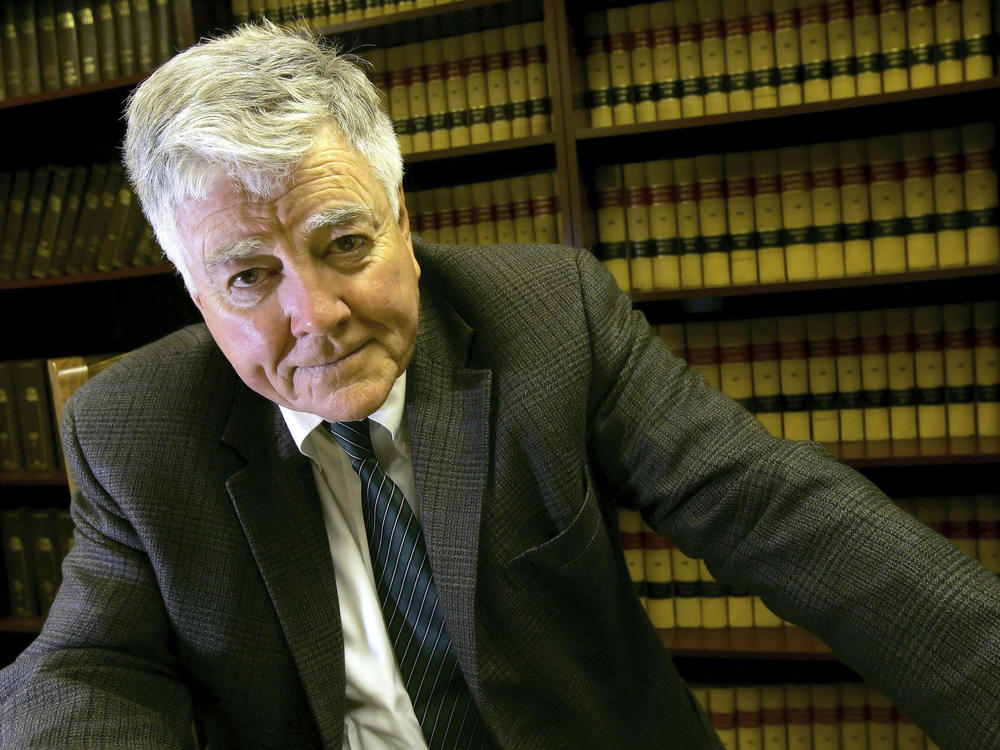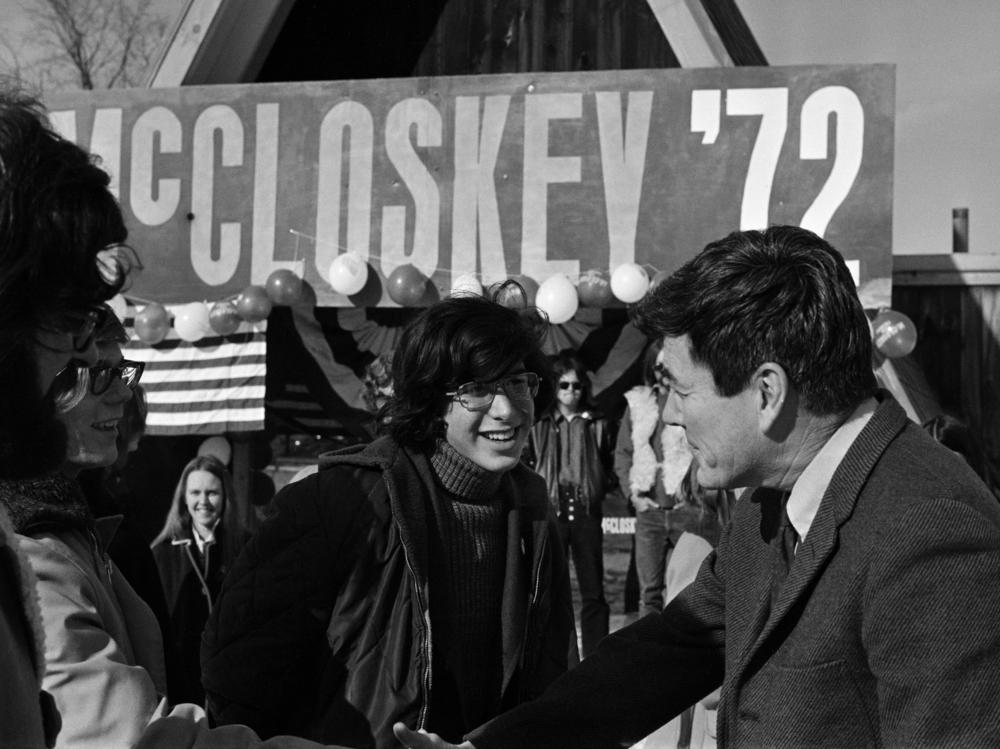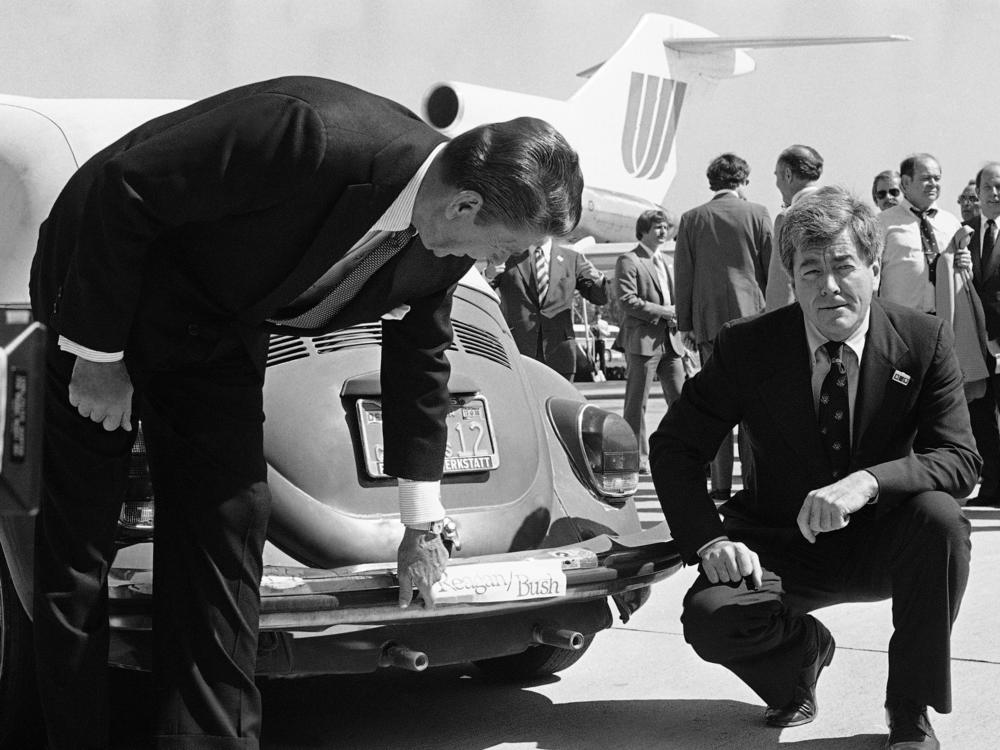Section Branding
Header Content
Pete McCloskey's life reminds us how politics long in the past live on in the present
Primary Content
Paul Norton "Pete" McCloskey Jr. was the kind of politician voters always say they dream of voting for, until they get the chance to vote for one.
Often called a man of principle because he risked his career bucking his party, his example stands out today because so few have followed it. The willingness to be a political Don Quixote, while never common in Congress, now seems vanishingly rare.
Once upon a time, however, there was Pete McCloskey, a Republican who displeased his party by challenging the renomination of its sitting president in 1972 — and then becoming the first Republican to call for that president's impeachment.
McCloskey died earlier this month at the age of 96 in a small town in rural Northern California. He had long been out of the limelight, but at the moment of his passing, the issues he had been willing to champion are as salient as ever.
McCloskey rose to national note as an outspoken opponent of the Vietnam War in the late 1960s, at a time when you could count on one hand the other House Republicans who had done so. Yet McCloskey stood in front of the Capitol to address throngs of angry young anti-war marchers in October of 1969.
The following year he was a co-founder of Earth Day and a co-sponsor of the Endangered Species Act as well as an early advocate for environmental laws and regulations that would later become the Clean Air Act and the Clean Water Act.
And as far back as the 1960s and 1970s he had been willing to criticize Israel and speak out for the Palestinian cause – even befriending Yasser Arafat, the leader of the Palestine Liberation Organization who died in 2004. With his friend Rep. Paul Findley of Illinois he founded a think tank in the 1980s to reconsider U.S. policy toward the Middle East.
A distant mirror of another time
McCloskey's time in office began in 1967 when a longtime Republican who had been representing the suburbs just south of San Francisco died in the midst of his term. McCloskey was practicing law with a small firm of what would come to be called "environmental lawyers" in Palo Alto, near where he had gone to college and law school at Stanford.
McCloskey campaigned hard and mobilized a younger contingent of voters interested in the environment and land use issues. That cadre helped him prevail in the Republican special primary vote against an opponent who was, to put it mildly, far better known.
Her name was Shirley Temple Black, and she had become a Republican activist after a charmed childhood as a singing and dancing movie star. Her fans included Franklin and Eleanor Roosevelt in the White House. In later years, Republican presidents would make her an ambassador, including to the United Nations, but in 1967 she was no match for the young, dynamic McCloskey and his cohort of volunteers.
That energy flowed naturally into the era's groundswell of opposition to the war in Vietnam. And McCloskey, with his own military background and demeanor, illustrated the heterodox nature of that era's "peace movement." He had served in the Navy in his college years and upon graduation enlisted in the Marines as an officer at the outset of the Korean War. He would win a Navy Cross, a Silver Star and two Purple Hearts leading a rifle company.
So when he returned from repeated visits to Vietnam and announced his opposition to the U.S. mission there, he was expressing in large part his frustration with the way the Marines were being used and the effect it was having on the Corps. Far from the stereotypical "peacenik," McCloskey was a fourth-generation Republican from Southern California. He liked to describe himself as a latter-day Theodore Roosevelt Republican: a warrior-turned-peacemaker, ardent conservationist and political progressive.
McCloskey's independence may have enhanced his popularity in parts of his district but it also brought him well-funded primary opponents in his first several bids for reelection. Denis Hayes, another co-founder of Earth Day, liked to say that McCloskey's work on the Endangered Species Act had made him an endangered species in his own party.
Undeterred by these threats, McCloskey further alienated intraparty colleagues by challenging the presumptive re-nomination of Republican President Richard Nixon for a second term. He filed to run in the 1972 New Hampshire primary, hoping to recapture the spirit that carried an anti-war Democratic Sen. Eugene McCarthy to a strong showing there in 1968. That insurgent success had contributed to the decision of the incumbent Democratic President Lyndon Johnson to leave the presidential race that year.
But four years later, the war had changed and the draft had been modified and much of the anti-war vote in New Hampshire was cast again in the Democratic primary instead of in McCloskey's. Having set himself a goal of 20% of the vote and fallen just short, McCloskey ended his challenge in time to seek reelection to Congress. Two opponents in the GOP primary of 1972 held McCloskey well under 50% of the vote but failed to deny him his nomination.
The next year, as revelations of the Nixon campaign's covert tactics emerged, one of the candidates who had been targeted by Nixon operatives turned out to be McCloskey. And as Nixon's role in covering up of these acts was coming into view and "Watergate" dominated conversation, McCloskey became the first Republican in Congress to call for the president's impeachment.
Nixon would resign in August of 1974. But just a few months prior to that McCloskey was helped in yet another tough primary fight by the endorsement of Nixon's vice president, Gerald Ford.
Issues in focus on the Hill and back home
Thereafter, as the war in Vietnam wound down, McCloskey devoted himself to his environmental causes and working on legislation with like-minded members of both parties. He also took a strong interest in his job as ranking member of the House Merchant Marine and Fisheries Committee, attacking what he saw as corrupt accommodations the committee's majority Democrats made to the shipping industry and its unions.
In 1982, a Senate seat came open with the retirement of incumbent Republican S.I. Hayakawa, who had risen to prominence battling student protesters in 1968 as the acting president of San Francisco State University.
McCloskey bid for the GOP nomination for that seat in a crowded field of notable names – including the son of Barry Goldwater and the daughter of Ronald Reagan. But he finished second to the mayor of San Diego, Pete Wilson, who would win reelection in 1988 and later serve two years as governor.
McCloskey made one attempt to get back into Congress in his late 70s. Having relocated to the Sacramento River Valley in retirement, he ran a protest campaign in the 2006 GOP primary against Republican Richard Pombo. McCloskey objected to Pombo policies he saw as anti-environment but added he could find no one else willing to run against the him in the primary. That last challenge failed, but when McCloskey shifted his support to Pombo's Democratic opponent in the fall, Pombo lost.
McCloskey finally changed his party affiliation in 2007 and backed the presidential candidacy of Barack Obama the following year, urging him "to try to reduce the influence money has played in our electoral process."
Since that time, of course, with the effects of Supreme Court decisions equating political campaign spending with free speech, the influence of money has only grown.
McCloskey was also critical at times of the impact of media organizations on the information reaching the voters. As a supporter of rights for Palestinians, for example, he argued that the American media mix did not include an advocate for their cause.
So considering both the current round of campus protests and the cause they espouse, McCloskey's story has both deep roots and burgeoning relevance.
It also serves as a reminder of a time when a person of his temperament and background would be attracted to a career in Congress and could still get elected with minimal financial resources against an opponent with vastly superior media visibility.
Correction
An earlier version of this story referred to a Navy Star award. The correct name is Navy Cross.



